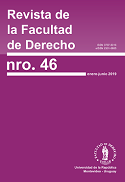Brief References to the Agreement of Economic and Scientific-Technical Collaboration. Subjection with the co-ownership agreement
Special Review of the Situation in Cuba
Abstract
The work is aimed at highlighting the importance of the economic and scientific-technical collaboration agreements and their link with the co-ownership agreement in Cuba, in the midst of a context where the updating of the economic model is closely followed on the basis of the Guidelines of the Economic and Social Policy of the Cuban Revolution, hence the connotation of their link with foreign investment, one of the pillars of the Industrial Property Policy approved in 2014.
The lack of international regulation of these figures, the regulation for the first time in Cuba of the contract of economic and scientific-technical collaboration and the role of co-ownership within these, stands out as something important because in the university and business field the practice leads to its incorporation for research, protection and commercialization of intangible assets.
It also discusses, how the Civil Code operates in its supplementary nature, in relation to co-ownership in Industrial Property modalities whose legal relationships are governed by special legislation, which only contain isolated articles in relation to the co-ownership regime.
The application of the presumption of equality and the principle of proportionality, voluntariness and equity brought from the civil right to intangible assets, are recorded as a solution for the calculation of the quota in the case of an intangible asset, a matter of great importance in determining of ownership in a co-ownership agreement.
Downloads
References
Brant, J. y Sibanda, M.. (2018). South Africa: IP Management and the Commercialization of Publicly Funded Research Outcomes. WIPO, Geneva. Recuperado de http://www.wipo.int/edocs/pubdocs/en/wipo_casestudy_ip_comm_za.pdf
Carbajo Cascón, F. (2016). La titularidad de derechos de autor sobre obras creadas en el seno de universidades y centros de investigación. Recuperado de http://www.cedro.org/blog/articulo/blog.cedro.org/2016/02/29/la-titularidad-de-derechos-de-autor-sobre-obras-creadas-en-el-seno-de-universidades-y-centros-de-investigacion
Commission of the European Communities (2008). Commission Recommendation on the management of intellectual property in knowledge transfer activities and Code of Practice for universities and other public research organisations”. C(2008)1329. Recuperado de http://ec.europa.eu/invest-in-research/pdf/ip_recommendation_en.pdf
Dávalos Fernández, R. (1993). Las empresas mixtas. Regulación jurídica. Consultoría Jurídica Internacional. La Habana: Editorial de Ciencias Sociales.
Fernández, M. (2008). Aspectos teóricos y prácticos de las situaciones de cotitularidad en los instrumentos públicos notariales. La Habana: Ediciones ONBC, Boletín de la Organización de Bufetes Colectivos, No. 31, abril-junio.
Intellectual asset management for universities. Intellectual Property Office, DPS/P100/12-13, Recuperado de https://assets.publishing.service.gov.uk/government/uploads/system/uploads/attachment_data/file/308072/ipasset-management.pdf
Lepinette Vázquez, T. (1996). La cotitularidad de los bienes inmateriales. Valencia. Tirant Lo Blanch, Biblioteca Jurídica Cuatrecasas. ISBN 978-84-8002-412-9
Morán Martínez, L., Odriozola Guitart, J. y Romero Suárez, P. L. (2011). La gestión de la Propiedad Industrial en la Transferencia de Tecnología: análisis en Cuba. Revista de Derecho, Universidad del Norte (36), 160-183.
Pérez Gallardo, Leonardo B. (2014). Código Civil de la República de Cuba, Ley No. 59/1987 de 16 de julio (anotado y concordado). La Habana: Editorial Félix Varela.
Resolución del VI Congreso del PCC. (2011). Lineamientos de la política económica y social del Partido y la Revolución. La Habana: PCC.
Documentos del 7mo. Congreso del Partido. (2017). Lineamientos de la política económica y social del Partido y la Revolución. Recuperado de http://www.granma.cu/file/pdf/gaceta/%C3%BAltimo%20PDF%2032.pdf
Sánchez González, Y. B. (2014). Cotitularidad de Patente de Invención Regulación en el ordenamiento jurídico cubano, Buenos Aires. Tesis de Derecho aplicado para optar al título de Magíster en Propiedad Intelectual en la Facultad de Derecho de la Universidad Austral.
RedOTRI Universidades y Conferencia de Rectores de las Universidades Españolas (CRUE). (2009). La I+D Bajo Contrato. Aspectos Jurídicos y Técnicos..
Universidad de Granada. (2017). NCG115/1: Normativa sobre los Derechos de Propiedad Industrial e Intelectual derivados de la actividad investigadora de la Universidad de Granada, Listar BOUGR: Boletín Oficial de la UGR, ISSN: 2173-1608 http://hdl.handle.net/10481/45518. Recuperado de http://digibug.ugr.es/handle/10481/45518?locale-attribute=es
Vázquez De Alvaré, D. y Moreno Cruz, M. (2015). La Inversión Extranjera en Cuba. Una visión desde el derecho”. La Habana: Editorial de Ciencias Sociales.
Vázquez De Alvaré, D. y Moreno Cruz, M. (2018). Políticas de ciencia, tecnología e innovación y su vínculo con la Propiedad Industrial. Especial referencia a las Universidades. Recuperado de http://www.ocpi.cu/eventos
Vázquez De Alvaré, D. (2018). La experiencia de la Universidad de La Habana en el uso del PCT en el marco de las estrategias de protección para las invenciones. Recuperado de http://www.ocpi.cu
Copyright (c) 2019 Dánice Vázquez D´ Alvaré

This work is licensed under a Creative Commons Attribution 4.0 International License.
This journal provides open access to its content, based on the principle that providing the public with free access to research helps a greater global exchange of knowledge
Revista de la Facultad de Derecho. Creative Commons Reconocimiento 4.0 Internacional License.










